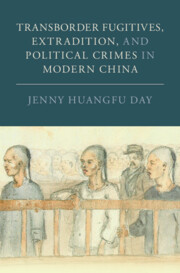Refine search
Actions for selected content:
7 results

Transborder Fugitives, Extradition, and Political Crimes in Modern China
-
- Published online:
- 10 November 2025
- Print publication:
- 30 October 2025
2 - The Origin of the “Political Offense Exception” in Sino-British Extradition
-
- Book:
- Transborder Fugitives, Extradition, and Political Crimes in Modern China
- Published online:
- 10 November 2025
- Print publication:
- 30 October 2025, pp 31-55
-
- Chapter
- Export citation
1 - Introduction
-
- Book:
- Transborder Fugitives, Extradition, and Political Crimes in Modern China
- Published online:
- 10 November 2025
- Print publication:
- 30 October 2025, pp 1-30
-
- Chapter
- Export citation
4 - Law and Justice at the Interstices of Empires
-
- Book:
- Transborder Fugitives, Extradition, and Political Crimes in Modern China
- Published online:
- 10 November 2025
- Print publication:
- 30 October 2025, pp 87-114
-
- Chapter
- Export citation
7 - Republican China’s Quest for Judicial Sovereignty and the Criminalization of Communism
-
- Book:
- Transborder Fugitives, Extradition, and Political Crimes in Modern China
- Published online:
- 10 November 2025
- Print publication:
- 30 October 2025, pp 180-209
-
- Chapter
- Export citation
Introduction
-
- Book:
- Enemies of the People
- Published online:
- 08 October 2021
- Print publication:
- 21 October 2021, pp 1-26
-
- Chapter
- Export citation
Spanish-German Extradition Treaty Case.
- Germany. 25 June 1926
-
- Journal:
- Annual Digest of Public International Law Cases / Volume 3 / 1929
- Published online by Cambridge University Press:
- 01 January 2021, pp. 308-309
- Print publication:
- 1929
-
- Article
- Export citation
